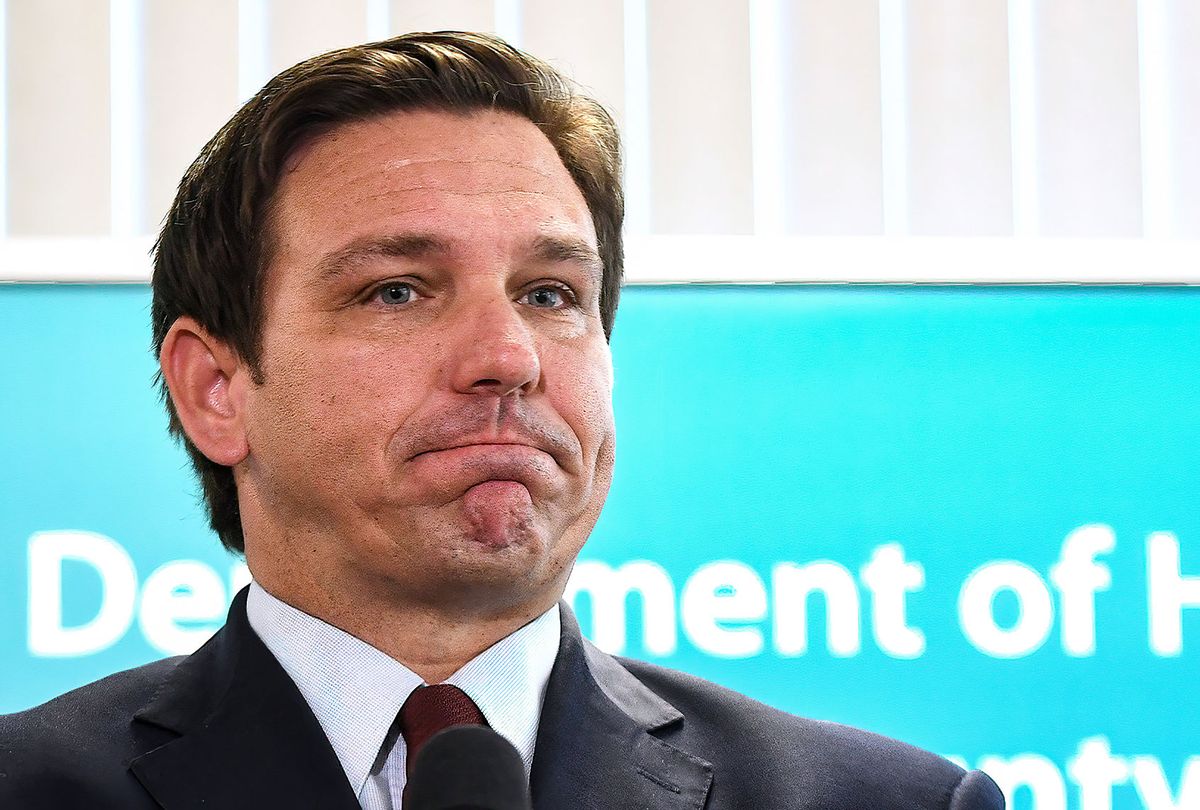A Florida judge on Wednesday ordered the state to immediately stop enforcing Gov. Ron DeSantis' ban on school mask mandates after finding that the governor overstepped his authority by issuing the executive order.
DeSantis, who has been positioning himself for a possible 2024 presidential run, in August rejected recommendations from the Centers for Disease Control and Prevention for kids to mask up in classrooms and barred school districts from requiring children to wear masks despite the state's massive surge in COVID infections. At least 13 school districts have defied DeSantis' order and a group of parents filed a lawsuit arguing that the directive was unconstitutional. Leon County Judge Leon Cooper last month ruled in favor of the parents, writing that DeSantis' order is "without legal authority."
The DeSantis administration last week defied the judge's order and sanctioned two school boards that implemented mask requirements after the governor's directive. Enforcement of the judge's order was automatically stayed when DeSantis appealed the ruling but Cooper on Wednesday ruled that the state must immediately halt enforcement of the ban because the governor's appeal is unlikely to succeed.
Cooper said that there would be "no harm" to the state if the order was not stayed but there would be to children who are too young to be vaccinated.
Want a daily wrap-up of all the news and commentary Salon has to offer? Subscribe to our morning newsletter, Crash Course.
"We are not in normal times. We are in a pandemic. We have children that can't be protected by vaccination," Cooper said, according to NBC Miami. "Children are at risk and they provide at least some protection by masking."
Cooper noted that the delta variant is "most infections and more dangerous to children" than previous versions of the virus.
"We're in a non-disputed pandemic situation with threats to young children who, at least based on the evidence, have no way to avoid this unless to stay home and isolate themselves," he said. "I think everybody agrees that's not good for them."
Cooper also rejected arguments from the DeSantis administration that children would be harmed if forced to wear masks.
"The greater weight of the evidence did not support the claim that mandatory face masks … would create any meaningful harm to those wearing it," Cooper said, pointing to CDC recommendations that all children over 2 years old wear masks in school.
Lawyers for the state disputed the judge's ruling, arguing that a new Parents Bill of Rights Law signed by DeSantis gives parents, not school districts, the right to decide whether their kids should wear masks.
"There is no possible way for the court to conclude the defendants would be unlikely to succeed on appeal," said Michael Abel, an attorney for the administration. "We believe we will prevail on appeal. But even if this is a close call, we would respectfully submit close calls would mitigate toward keeping the stay intact."
Cooper said that the Parents Bill of Rights also gives parents the right to protect their children against infection risk from unmasked classmates. He ruled last month that the state has no authority to punish districts for policies that are "reasonable" and have a "compelling state interest."
"By passing the Parents' Bill of Rights, the Florida Legislature necessarily recognized the importance of parental rights," Cooper wrote. "But it also recognized that parents' rights are not immune to some reasonable limitation depending upon safety and reasonableness and compelling state need regarding health care or condition of the child."
DeSantis, who has staked his political aspirations on his widely-criticized pandemic response, bristled over the judge's ruling on Wednesday and questioned without a hint of irony why masks had become so politicized.
"I don't know why the masks have politics around it," he said at a news conference. "Let the parents make the decision that's best for their kids. If you want masks, do it. If you don't, that's fine."
Dr. Anthony Fauci, the National Institute of Allergy and Infectious Diseases, rejected DeSantis' opinion that vaccines are a personal choice that don't affect others as "completely incorrect."
When you have a virus that's circulating in the community and you are not vaccinated, you are part of the problem," he told CNN. "Because you're allowing yourself to be a vehicle for the virus to be spreading to someone else."
The case will now head to the state's First District Court of Appeal. "They'll thoroughly consider the arguments of all parties, and they'll make a decision, then it may or may not end up at the Florida Supreme Court," Cooper said on Wednesday.
DeSantis said he was confident the more conservative appeals court will sustain his original order, which would then also face a separate legal challenge in federal court by 12 parents of Florida school children with disabilities. The lawsuit argues that children with disabilities are at particularly high risk of becoming severely sick or dying from the virus if they attend classes with unmasked peers and that by withholding funds from school districts the state had violated the Americans With Disabilities Act, the Individuals with Disabilities Education Act and the Rehabilitation Act.
"Governor DeSantis does not have the authority to interfere with these children's rights under the Supremacy of the United States Constitution," the suit says, adding that if "students with disabilities cannot go to school safely, then no one can go to school safely."
DeSantis earlier this year issued another executive order barring private companies from requiring "vaccine passports." Norwegian Cruise Line sued the administration over the order and federal Judge Kathleen Williams last month granted the company a preliminary injunction because it would be "irreparably injured" by the ban. The judge said that the company was likely to win the case because it had a responsibility to ensure its passengers are vaccinated and that Florida failed to provide a "valid evidentiary, factual, or legal predicate" for the ban.



Shares